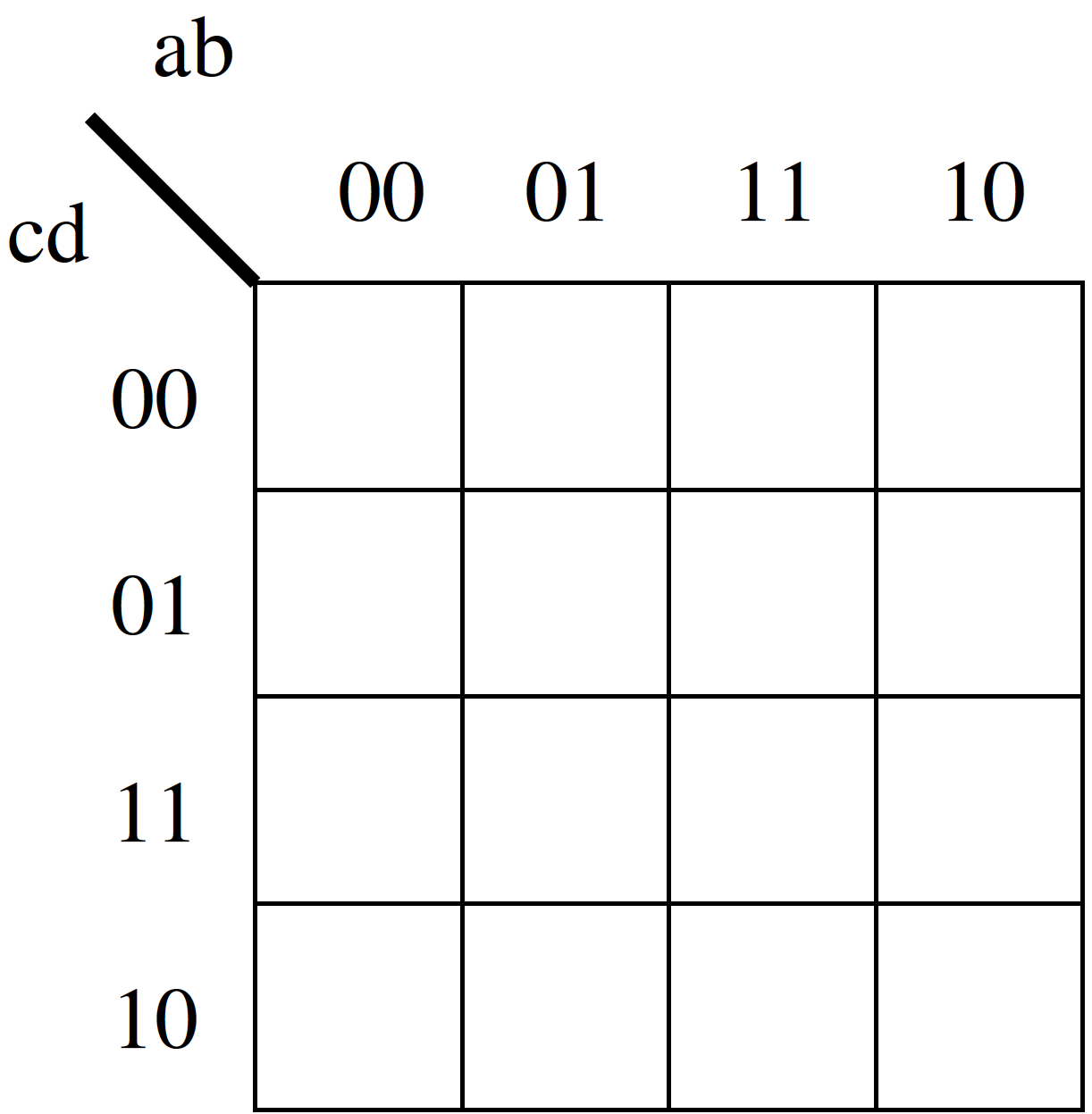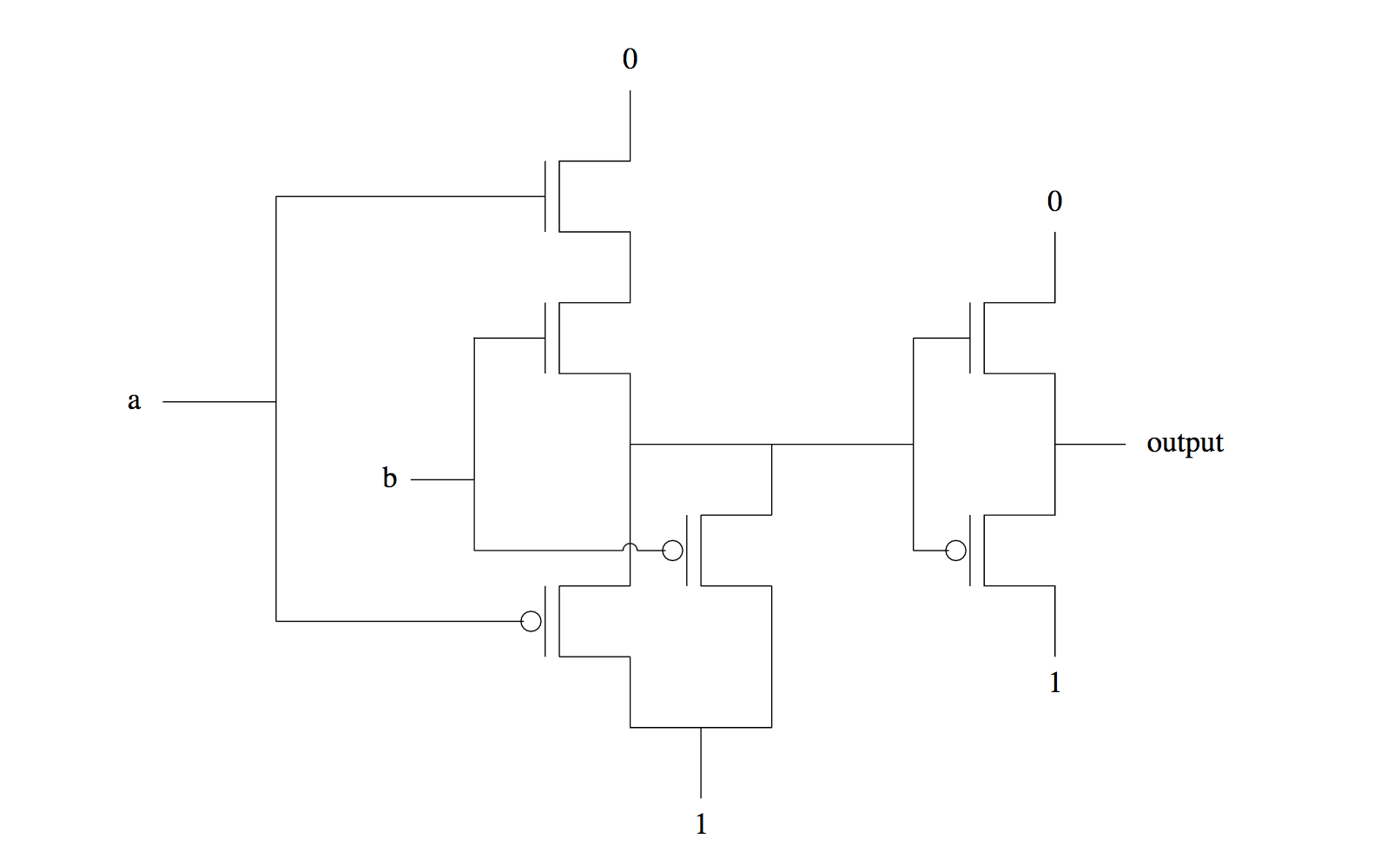- _____ Any Boolean function can be computed by a circuit with only NOR gates.
- _____ Any Boolean function can be computed by a circuit with only NOT and AND gates.
- _____ Any Boolean function can be computed by a circuit with only AND gates.
- _____ There are O(n) full-adders in a ripple-carry-adder circuit adding two n-bit numbers.
- _____ The three-input majority circuit can be built with 5 two-input NAND gates.
- _____ A p-type transistor allows current to flow from source to drain when the gate input is set to 1.
- _____ An n-type transistor allows current to flow from source to drain when the gate input is set to 1.
- _____ A four-input K-map has 64 squares.
- _____ A 6-transistor SRAM cell contains two inverter circuits.
- _____ Modern CPUs from AMD and Intel are 32-bit processors.
- _____ The program counter register on x86-64 is called "%rax"
- _____ Condition codes contain facts about recently executed arithmetic or logical operations.
- _____ Memory is addressed as a three-dimensional array of bits.
- _____ Suppose %rcx=1 and %rbx=2. On a Linux x86-64 system, after we execute "movq %rbx, %rcx," the %rbx register will be 2.
- _____ %rdx is a register that points to the top of the machine stack.
- _____ For C/C++ programs, x86-64 stores integer data in memory in little-endian format.
- _____ For C/C++ programs, x86-64 stores string data in memory in little-endian format.
- _____ Suppose a C/C++ function returns an int. In assembly language, the return value would be kept in the %eax register.
- _____ The x86-64 instruction set uses little-endian representation.
- _____ ASCII stands for "A Simple Code for Internet Information."
- Consider the following C/C++ code:
unsigned int a = 0x1eab577e; unsigned char *b = (unsigned char *) & a; for (int i=0; i<4; i++) printf ("%x", (unsigned int) b[i]);What is the output of this code on a Linux x86-64 system? Note that the "%x" format specifier for printf prints an unsigned integer as hexadecimal.
- Now look at this C/C++ code:
unsigned int a, b; int c, d; a = 1 << 31; b = a * 2; printf ("%x\n", b); a = 0x1234; b = a >> 12; printf ("%x\n", b); c = -16; d = c >> 4; printf ("%d\n", d);What is the output of this code on a Linux x86-64 system? Note that the "%d" format specifier for printf prints an integer as a decimal number.
a b c d + a b c d + a b c d + a b c d + a b c d + a b c d + a b c d + a b c d
- Fill in the following 4-input K-map with 1s and 0s equivalent to the function computed by this Boolean formula. Note that each product in that Boolean formula yields a 1 in a distinct K-map square.

- Give the minimal sum-of-products representation of this Boolean formula. That is, give a formula that computes the same function but has a minimal number of ORs and ANDs. Hint: there are three products and each one has only two variables in it. You should be able to read the minimal sum-of-products directly from the K-map; you should not need to do any further algebraic manipulations (so don't write a lot).

Give a truth table for the Boolean function of a and b computed by this circuit.
int foo (int a, int b, int c) {
int t = a + b;
int t2 = c - t;
return t2;
}
When compiled into x86_64, it looks like this:
foo:
movl %edx, %eax
addl %esi, %edi
subl %edi, %eax
ret
%edi, %esi, and %edx are parameters a, b, and c, respectively. Note that we are using registers like %eax instead of %rax because the parameters and variables are 32-bit integers, not 64-bit integers.
- Which register holds the value of t?
- Which register holds the value of t2?
- Which register holds the return value?